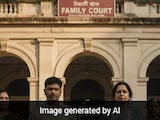A special POTA court in Mumbai has awarded death sentence to the three accused held guilty last week for the 2003 blasts that killed over 50 people.
This is the first time a husband and wife have been held guilty of terror activities in the country.
The court had held them guilty of conspiracy, murder and also under the prevention of terrorism act or POTA. This has been the biggest blasts case after the 1993 serial blasts trial and took six years to complete.
The special POTA judge M R Puranik had convicted Ashrat Ansari (32), Hanif Sayed Anees (46) and his wife Fehmida Sayed (43) last week for their role in carrying out the blasts in which 52 people were killed and 100 injured.
Special Public Prosecutor Ujjwal Nikam had asked for stringent punishment. During the trial, Nikam examined 103 witnesses, including an accused Zahid Patni, who turned approver. Patni unravelled the details of the conspiracy which was apparently hatched in Dubai by LeT members.
Another star witness of the prosecution was a taxi driver Shivnarayan Vasudev Pandey. His taxi was used by the Sayed family a day before and on the day of the blast.
Hanif Sayed Anees had on Tuesday pleaded for mercy. His lawyer said Syed was ready to spend the rest of his days behind bars without ever asking for release on parole, provided he was not given the death sentence.
Hanif's lawyer said, "The state has said that life imprisonment in terror-related cases will extend up to 50 years. This means that my client will never breathe the air of freedom in this life. Also the Supreme Court had commuted a death sentence when a convict said he would never claim premature release on parole."
He also said Hanif had ''full faith in the Indian judicial system'' and never misbehaved in jail.
The trio was convicted under sections of IPC for conspiracy, murder and attempt to murder. They were also found guilty under sections of POTA, Explosives Act, Explosive Substances Act and Prevention of Damage to Public Property Act.
The convicts were also involved in placing an unexploded bomb in a bus at suburban SEEPZ on December 2, 2002, and another explosive device in a bus at Ghatkopar on July 28, 2003 in which two persons were killed due to the explosion.
However, Pakistan-based terror outfit LeT, to which the three were linked, decided to conduct high intensity explosions, and hence powerful bombs were planted at two taxis in Zaveri Bazaar and Gateway of India on August 25, 2003.















